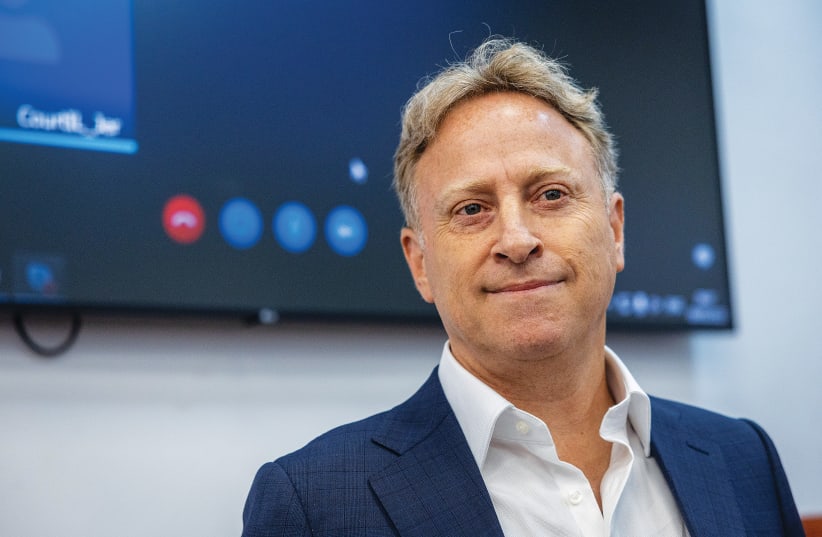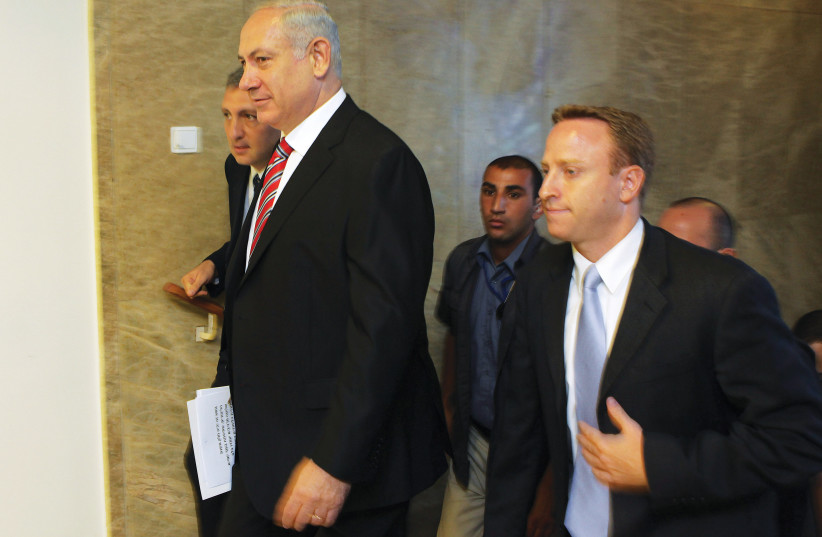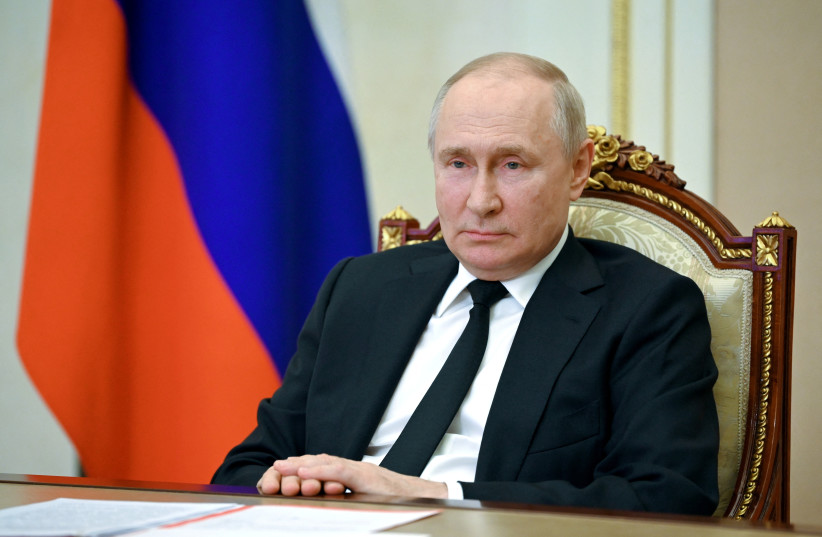Few people in Israel in the last 15 years have walked the halls of power at key moments in history the way Ari Harow, Prime Minister Benjamin Netanyahu’s former chief of staff, has.
Harow is unique in being able to tell inside never-before-revealed stories from interacting with former Mossad chief Yossi Cohen, former attorney-general Avichai Mandelblit, former IDF chief Aviv Kohavi, as well as regarding relations with Russia, Japan, Netanyahu’s corruption trial and Israeli war and peace decisions in general.
In his first exclusive on-record interview since leaving Netanyahu’s service in 2015, and with a first sneak peek at his exciting and full-of-new-disclosures upcoming book, My Brothers’ Keeper, Harow made a number of such revelations to The Jerusalem Post.
He worked on and off for Netanyahu for over a decade, from 2002 to 2015, but at the time that Harow returned to serve as Netanyahu’s chief of staff in 2014, Cohen had started shortly before as Netanyahu’s National Security Council (NSC) chief.
In his book, Harow mostly praises Cohen, but also makes some vague, unexplained references to early tensions between the two, which eventually led to a very productive relationship.
Speaking to the Post about Cohen and his predecessor NSC chiefs, Harow gave more details. “Uzi Arad was the first NSC chief who moved his office into the Aquarium [Netanyahu’s inner bureau]. He actually knocked [top Netanyahu adviser] Ron Dermer out of the Aquarium.
“Ron Dermer did not care, because his relationship to the prime minister had nothing to do with the distance of the offices, but Uzi Arad was a different person; he forced his way inside,” said Harow.
“That’s the way it remained under [NSC chief Yaakov] Amidror. Yossi Cohen comes in and he decides that not only is he inside the Aquarium, but he is expanding” the NSC presence on that floor. “Until then, the main office of the NSC was not even in the prime minister’s building,” Harow continued.
Also, Harow told of how Cohen “let go” a certain individual whom Netanyahu was fond of, despite Harow’s warnings.
Next, he said, “When push came to shove... I went and told the prime minister we should prepare for this person to be leaving. That was the last time that Yossi did something like that,” since Netanyahu was even willing to pull officials like Cohen out of meetings in places like Russia over unsatisfactory personnel decisions.
Yet, after a reprimand from Netanyahu, Cohen and Harow agreed on clearer lines of communication going forward, and they “got along very well” from that point on, according to Harow.
In fact, Harow added that after the two found their positive balance, which characterized most of their joint work, he even campaigned for Cohen to get the position of Mossad chief. He told Netanyahu that Cohen had proven himself to be not only qualified for the post, but also ideologically aligned.
The Post has learned that when Netanyahu would later dub Cohen and Dermer as his two most probable successors, this was because he viewed them as grasping the gravity of the Iranian nuclear threat and understanding the lengths which Israel must go to in order to block Iran from getting nukes.
The Post understands that while Cohen’s actions as Mossad chief have received significant accolades, the groundwork for his actions, as well as his personal involvement in what would later develop into the Abraham Accords, started when he was NSC chief.
Cohen, as NSC chief, was the clandestine point man for Netanyahu on Iran-related matters, Russia, and other countries, including initiating talks with countries in the region, the Post understands. Sources say all of this was to the chagrin of then Mossad director Tamir Pardo, and played a critical role in his future appointment as Mossad chief.
Former attorney-general/cabinet secretary Avichai Mandelblit
By 2020, Avichai Mandelblit would become Netanyahu’s enemy No. 1 when he filed a public corruption indictment against him. However, as cabinet secretary in 2014, Harow viewed Mandelblit as a stalwart ally.
“In every Netanyahu government, when there was an opportunity – and definitely in the Obama years – to approve building in Judea and Samaria, you took advantage. You knew it was going to be a struggle with America anytime you approve building. Unfortunately, tragedy gives openings to pursue,” he explained.
Much of Harow’s book revolves around the 2014 Hamas murder of three Jewish teenagers, which led to an Israeli counter-arrest operation, which led to a terror escalation by Palestinian terrorist groups, which led to the 50-day-long 2014 Gaza war.
“That day,” he continued, “when the boys were found, the prime minister asked Mandelblit as cabinet secretary to put together a list for building. Avichai worked on it, put it together, and came to me with the list.
“I received a phone call from Orit Struck. She was not a Knesset member at the time. She told me that 60 units have been waiting for approval forever in Hebron. Avichai knew about it. I came to him and said there is a certain poetic justice. The two terrorists are from Hebron. This should be part of the package. He agreed with me 100%,” he recalled.
Further, he stated, “Definitely during his time in the Prime Minister’s Office, he was a very true ideologue. He and I went to the prime minister together. He presented the list. We made a special plea for these 60 units in Hebron. The prime minister approved.
“It must have been shortly after that that Yitzhak Molcho comes to meet with the prime minister. He was always a lawyer-style negotiator who was very good at his job. He was always the one to try and temper quick responses,” according to Harow.
The plan had been that “we were going to announce approval of all of these buildings, including the Hebron units, on the same day. Molcho convinced the prime minister to wait 24 hours, saying ‘We don’t need to be shooting from the hip. Let’s say we aren’t just reacting, there is thought and a process.’ This was against the advice of Avichai and myself, but the prime minister sided with Molcho on this one.”
Harow said that “unfortunately, we woke up the next morning with the murder of east Jerusalem minor [Mohammed] Abu Khdeir. At that point, it was all off the table – not just Hebron; all the building which was supposed to be announced. We lost whatever political or diplomatic capital we had, with that murder.”
On a personal level, Harow is very committed to Hebron’s special value to Israel. “To see his [Mandelblit’s] motivation in trying to push that forward after five years where nothing had been done... the fact that Mandelblit felt it was important to push forward with the Hebron building... I felt that was a very courageous and ideological approach.”
He clarified that there had been other great cabinet secretaries, but that “this was going further than others had, and I found a willing partner in that.”
Former IDF chief Aviv Kohavi
One big disclosure in Harow’s book is a critical moment he had in 2014 with Kohavi, who at the time was Military Intelligence chief.
In the middle of the 2014 Gaza war, Harow writes, “during one of the many endless days inside the Tel Aviv PMO, Maj.-Gen. Aviv Kohavi... grabbed me by the arm for a side chat away from the prying ears of everyone else. ‘You’ve got to get the prime minister to bring this to an end,’ Kohavi said, ‘there’s no purpose in continuing this.’ When the military insists that the fighting end, it is a harbinger of political and public pressure to do the same.”
Questioned about why this moment, out of possibly hundreds of moments with many top military officials, stood out to him, Harow explained. “There were two reasons. I had tremendous respect for Kohavi. He was a very serious person, a decent person, a patriotic person, not to” put down others around the table.
“What stood out for me at that moment was when you are getting a sense from the military that this operation had run its course – you’re working against the clock. That’s what stuck out in my mind,” he said.
Moreover, he stated that with war, “it’s a constant tug-of-war of varying considerations: there are military considerations, diplomatic considerations, and long-term security situations. In any military operation, on the one hand you want maximum military gains, but you also want to minimize diplomatic damage... and any damage to the home front,” said Harow.
A variety of psychological factors “come into play in that equation. One is the overall determination within the military itself, which is not just about: are you conquering another house or village? but, more broadly, how are Israel and the IDF doing?” he said.
In addition, he stated, “To hear from the head of Military Intelligence [that] we have reached the tipping point – that was definitely harrying. On one hand it was eye-opening, and there are a whole slew of calculations and considerations coming into play here.”
“[Then defense minister Moshe] “Bogie” [Ya’alon] was wearing a different hat as defense minister. The IDF chief of staff was also looking at many different aspects for managing a conflict,” according to Harow.
Both the defense minister and IDF chief are “not just looking at what is happening on the military front, but also the media front and,” to some extent, the political front.
Further, cabinet officials are also looking at a wider political picture, separately analyzing the cabinet, the government, the Knesset, and leaks that may come out from the cabinet protocols.
Also, Harow noted, “There is dealing with the Americans. [Then US secretary of state John] Kerry comes in. [Then UN secretary-general] Ban Ki-moon comes in. There are Egyptian efforts to reach a ceasefire and Qatari efforts to reach a ceasefire.
“All of this is happening with mostly 18-19-year-old boys fighting for their and our lives, battling the terrorists. That moment stands out for me, when the head of Military Intelligence” tells me from a war perspective we need to end the fighting, and “he’s not thinking about Kerry or [Naftali] Bennett or how it plays out in the media – he says ‘Ari, this is that moment.’”
Russian President Vladimir Putin
Regarding the critical Netanyahu relationship with Russian President Vladimir Putin, Harow discussed how the prime minister broke new ground in a variety of areas.
The majority of the meetings were with only “eight eyes, Putin and his translator and Netanyahu and his translator, Ze’ev Elkin. Maybe sometimes they would briefly bring in the military secretary or the NSC chief. So it was a much smaller forum.
“There was a sense among the Western countries, mostly the US, that Russia could not be dealt with when it comes to the Iranian issue – that they are on the other side of the table,” he said.
Next, he stated, “One of the great achievements of Netanyahu during those years was the ability to maintain strong relations with Putin and Russia for the purpose of curbing Iran’s regional influence and slowing down their nuclear ambitions.
“There is no doubt that Netanyahu is shrewd and an extremely experienced diplomat. He knew how to develop personal relationships and how to use that with very specific goals in mind,” he remarked.
Also, Harow said, “Netanyahu was always very goal-oriented. He didn’t develop relationships or take on any assignment just for the sake of it. There was always a very concrete and tangible goal in mind. That is something which no doubt played out in his regular meetings with Russia and Putin.”
Adventures in Japan
In May 2014, Netanyahu undertook a historic visit to Japan, with Harow in tow along with a range of other officials.
“Netanyahu astutely makes the decision that while the US is Israel’s closest friend and ally, it is important for Israel to expand from economic and security perspectives to some of the BRIC [Brazil, Russia, India, China] countries” in Asia, Harow explained.
Recounting a key moment from the visit, he said, “I had never been at a meeting with another country where they had pre-scripted every word that was said. They had come in with sheets of paper that they were reading from, line by line, pre-scripted A to Z.”
“At the beginning of the first meeting with [then Japanese premier Shinzo] Abe, he pulls out his ‘cheat card’ and says whatever about the Palestinians: one line about the occupation and the Palestinians, and then he puts the cards down and says ‘Okay, let’s go for dinner,’” he said.
“It was so blatant that he was just checking the box – and now let’s move on. And it was clear how relations between Israel and Japan had nothing to do with the Palestinians. He just had to check that box. It was very glaring to me and to the prime minister at the time,” he added.
Moreover, he noted, “It heightened Netanyahu’s belief in the Abraham Accords. It was not that the Palestinians would bring peace to the Arab world, but that the Arab world would bring peace to the Palestinians.”
There was a not-so-glamorous side to serving as Netanyahu’s chief of staff.
During the Japan trip, back home in Israel there was a political issue with Tzipi Livni. “I did not sleep for three nights. I was in Netanyahu’s suite with him all night, every night. One day I got back to my room, just to put on tefillin, and quickly showered and then went back to Netanyahu, with literally no sleep.”
Trial
Addressing his role in Netanyahu’s trial and spin-off personal legal issues, he said, “As long as the trial is still going on, I am not going to comment. My testimony was public and is there for everyone to see and read.
“One thing I will say, it has been extremely difficult and unfortunate to be caught up in this type of a situation for such a long period of time; having over seven years of challenges and uncertainty definitely was extremely difficult. Being past the testimony – that is definitely something I feel very grateful for,” said Harow.
What is his relationship with Netanyahu after over a decade of being super close, followed by seven years of the trial intervening in their relationship?
According to Harow, “I have not spoken to him [directly] in a number of years [since Netanyahu’s public corruption case heated up]. It was an honor and a privilege for me to work for Netanyahu. It was an honor and privilege which Netanyahu gave me to serve the State of Israel.
“I have nothing but gratitude for that and for him as a leader – that in the years I spent with him, we accomplished a tremendous amount for the State of Israel, and he was a fierce defender of the people of Israel,” he declared.
Unlike former top Netanyahu aide Nir Hefetz, who holds Netanyahu responsible for his being tossed into the criminal trial, the impression is that some day after the Netanyahu trial concludes, Harow and Netanyahu may be in touch again, since neither bears anger against the other. •


